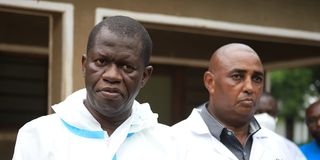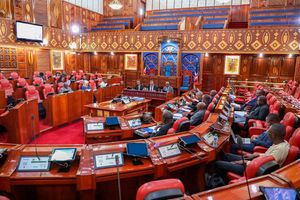Is it time to rethink the office of chief government pathologist?

Chief Government Pathologist Johansen Oduor (left) and DCI Homicide Director Martin Nyuguto during a press briefing on the autopsies on the Shakahola cult death victims conducted on May 1, 2023.
What you need to know:
- This level of investment required to run this office is clearly not being provided through the Ministry of Health.
- The service is not adequately prioritised, the ministry’s main focus is really with those who are living, not the departed. The investigative nature of the service squarely puts this under the National Police Service.
My first-ever encounter with the chief government pathologist was in the news. The year was 1990, in February, the month of love. Only there was nothing romantic about the grave announcement of the demise of Dr Robert Ouko, the then Minister for Foreign Affairs and International Cooperation.
The little black and white televisions across the country flickered with the Voice of Kenya announcing that the charismatic minister had been found dead, a few kilometres from his Koru home. Despite being a time when Kenyans lived in fear of free expression due to political climate, it was not possible to shush the loud whispers of adults around us.
The then government pathologist, Dr Jason Ndaka Kaviti, became a most ridiculed household name. According to the press, he had pretty much arrived at the most unbelievable account that the minister had doused himself in kerosene, set himself on fire and shot himself on the head. The country could not stop talking. The Ouko murder mystery dominated the limited press available at the time for so many months, yet to date, his murder remains a mystery.
A decade later, the country was subjected to yet another government pathologist circus when six prisoners in King’ong’o maximum security prison turned up dead, with gruesome injuries. The government pathologist, Dr Kirasi Olumbe, stoically stood by his conclusion that the injuries were consistent with a fall; a theory that was rather rapidly trashed by the Provincial pathologist, Dr Moses Njue, much to the chagrin of the state.
In a rather interesting turn of events, Dr Njue was the one to inherit the office of the chief government pathologist from Dr Olumbe, who left office, together with the rather intolerant regime. He had the almost impossible task of sanitising the image of the this highly sensitive office. It was no mean feat. At retirement, he handed over the baton to the current office holder, Dr Johanssen Oduor, one who has also seen his fair share of drama in office, currently with the ongoing Shakahola case investigations.
Why, pray tell, is this office so much in the limelight, yet it has never been granted the autonomy befitting its purpose?
Why is it that this office remains so misplaced? Why is an investigative office domiciled in the Ministry of Health? This office has remained in the wrong ministry since its inception in Kenya; when it is actually supposed to be a directorate in the National Police Service.
The office of the Chief Pathologist, also known as the Chief Coroner, the Chief Medical Examiner or the Chief Medical Investigator; but despite being lumped together, these terminologies mean different things. The Coroner is a person appointed by the state to determine the cause of death of the deceased. This person may or may not be a medical practitioner. The origin of this office stems from the medieval times, when the King appointed a ‘Crowner’, who was responsible in ensuring that for all people who had died, their death dues were fully paid. In jurisdictions that still maintain this office, the Chief Coroner appoints independent forensic pathologists to provide the technical expertise and perform the autopsies, where needed.
The Medical Examiner is a doctor appointed in a jurisdiction to provide the same service. This doctor may not necessarily be a pathologist, but can accurately diagnose the cause of death for those with straight-forward reasons for demise. However, the person is also going to require the services of a forensic pathologist in cases where the manner of death is suspected to be homicide, suicide, accidental or undetermined.
The pathologist is a medical doctor, who has specialised in pathology, able to determine the cause and manner of death, whereas the forensic pathologist has undergone additional training to be able to execute this mandate through a law-enforcement investigative lens, as their findings are intended to aid in police investigations.
In Kenya, we are lucky that the office of the Chief Government Pathologist has retained the service of a forensic pathologist from the outset. However, it is not possible for the one specialist to be everywhere at the same time. For this reason, he is forced to appoint pathologists otherwise working for county facilities, with no clear mechanism for their reimbursement for the services rendered. This results in lack of justice where the family of the deceased is unable to pay for the autopsy.
This entire process requires to be domiciled under the National Police Service as a substantive department with its own budgetary allocation. It should actually be merged with the National Forensic Lab to provide end to end service for gross post-mortem and attendant histopathology and all other chemistry studies required. Further, it will allow for the Chief Government Pathologist to appoint independent pathologists at county level, who are appropriately remunerated by this department, to provide service to all Kenyans equitably.
This level of investment required to run this office is clearly not being provided through the Ministry of Health. The service is not adequately prioritised, the ministry’s main focus is really with those who are living, not the departed. The investigative nature of the service squarely puts this under the National Police Service.
As we implement the Bottom-up Transformational Agenda, let us not forget to ensure that justice is served for those who have departed under these difficult circumstances.
`Dr Bosire is an obstetrician/ gynaecologist





